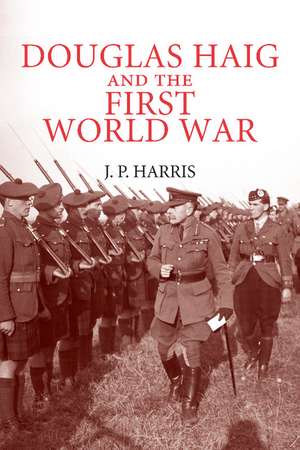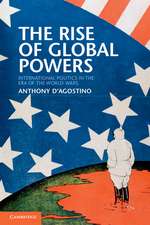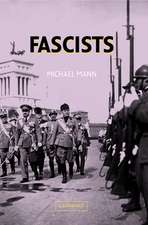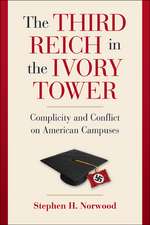Douglas Haig and the First World War: Cambridge Military Histories
Autor J. P. Harrisen Limba Engleză Hardback – 5 noi 2008
| Toate formatele și edițiile | Preț | Express |
|---|---|---|
| Paperback (1) | 262.94 lei 6-8 săpt. | |
| Cambridge University Press – 14 oct 2009 | 262.94 lei 6-8 săpt. | |
| Hardback (1) | 721.78 lei 6-8 săpt. | |
| Cambridge University Press – 5 noi 2008 | 721.78 lei 6-8 săpt. |
Din seria Cambridge Military Histories
-
 Preț: 274.69 lei
Preț: 274.69 lei -
 Preț: 231.09 lei
Preț: 231.09 lei -
 Preț: 230.10 lei
Preț: 230.10 lei -
 Preț: 274.69 lei
Preț: 274.69 lei -
 Preț: 200.28 lei
Preț: 200.28 lei -
 Preț: 174.33 lei
Preț: 174.33 lei -
 Preț: 155.66 lei
Preț: 155.66 lei -
 Preț: 185.60 lei
Preț: 185.60 lei -
 Preț: 280.46 lei
Preț: 280.46 lei -
 Preț: 172.41 lei
Preț: 172.41 lei -
 Preț: 234.23 lei
Preț: 234.23 lei -
 Preț: 218.33 lei
Preț: 218.33 lei -
 Preț: 182.37 lei
Preț: 182.37 lei -
 Preț: 235.32 lei
Preț: 235.32 lei -
 Preț: 200.77 lei
Preț: 200.77 lei -
 Preț: 290.73 lei
Preț: 290.73 lei -
 Preț: 287.31 lei
Preț: 287.31 lei -
 Preț: 199.90 lei
Preț: 199.90 lei -
 Preț: 276.61 lei
Preț: 276.61 lei -
 Preț: 304.13 lei
Preț: 304.13 lei -
 Preț: 286.69 lei
Preț: 286.69 lei - 11%
 Preț: 699.36 lei
Preț: 699.36 lei -
 Preț: 425.13 lei
Preț: 425.13 lei -
 Preț: 432.26 lei
Preț: 432.26 lei -
 Preț: 270.07 lei
Preț: 270.07 lei -
 Preț: 271.39 lei
Preț: 271.39 lei - 11%
 Preț: 697.14 lei
Preț: 697.14 lei - 11%
 Preț: 698.68 lei
Preț: 698.68 lei -
 Preț: 387.22 lei
Preț: 387.22 lei -
 Preț: 287.48 lei
Preț: 287.48 lei -
 Preț: 237.16 lei
Preț: 237.16 lei -
 Preț: 321.74 lei
Preț: 321.74 lei -
 Preț: 323.27 lei
Preț: 323.27 lei -
 Preț: 421.06 lei
Preț: 421.06 lei - 14%
 Preț: 758.35 lei
Preț: 758.35 lei -
 Preț: 426.91 lei
Preț: 426.91 lei
Preț: 721.78 lei
Preț vechi: 839.28 lei
-14% Nou
Puncte Express: 1083
Preț estimativ în valută:
138.13€ • 149.99$ • 116.03£
138.13€ • 149.99$ • 116.03£
Carte tipărită la comandă
Livrare economică 22 aprilie-06 mai
Preluare comenzi: 021 569.72.76
Specificații
ISBN-13: 9780521898027
ISBN-10: 0521898021
Pagini: 666
Ilustrații: 19 b/w illus. 24 maps
Dimensiuni: 159 x 235 x 38 mm
Greutate: 1.18 kg
Ediția:1
Editura: Cambridge University Press
Colecția Cambridge University Press
Seria Cambridge Military Histories
Locul publicării:Cambridge, United Kingdom
ISBN-10: 0521898021
Pagini: 666
Ilustrații: 19 b/w illus. 24 maps
Dimensiuni: 159 x 235 x 38 mm
Greutate: 1.18 kg
Ediția:1
Editura: Cambridge University Press
Colecția Cambridge University Press
Seria Cambridge Military Histories
Locul publicării:Cambridge, United Kingdom
Cuprins
Introduction; 1. Boyhood and early career; 2. South Africa to the Curragh crisis; 3. Anxiously to war; 4. From the Marne to the Salient; 5. Army commander; 6. Aubers Ridge to Givenchy; 7. The Battle of Loos; 8. Commander-in-Chief; 9. The Battle of the Somme (1); 10. The Battle of the Somme (2); 11. Lloyd George and Nivelle; 12. The Battle of Arras and the Nivelle Offensive; 13. Flanders Fields; 14. The third Battle of Ypres; 15. The Battle of Cambrai; 16. The last war winter; 17. The German March offensives; 18. The turn of the tide; 19. The final campaign; 20. The post-war years; Conclusion.
Recenzii
'Harris' judgement of Haig is, ultimately, critical but fair. He arrives at it through careful analysis and detailed interpretation. This really is the definitive book on Haig, his actions and his legacy.' Tribune
'If you wish to understand how the First World War was fought and won, and seek a balanced assessment of British generalship in that victory, then there is no better a book written on it than this.' British Army Review
'This work of meticulous scholarship is certain to re-energize the debate over Haig's command. It also in many important ways expands our understanding of military operations in France and Flanders and the BEF's evolution into a formidable offensive machine. It is highly recommended to both academics and general readers.' The American Historical Review
'According to Dr J. P. Harris, senior lecturer in War Studies at the Royal Military Academy Sandhurst, Haig was not quite the uncaring monster of popular myth but nor was he, as some recent studies have suggested, a clear-sighted and imperturbable leader who should take the credit for Britain's ultimate victory … Dr Harris argues that Haig's failings led him to misread the strength of the German armies.' The Times
'This is a landmark book … if you take your history seriously, it must be read.' The Society of Friends of the National Army Museum
'Paul Harris has not only written the definitive biography of Field Marshal Douglas Haig, but the most important book on the First World War to appear in over a decade. His judicious use of sources and impeccable research has placed Haig in the context of the terrible challenges that that terrible conflict raised. The resulting portrait presents his considerable strengths along with the fatal flaws that were to prove so disastrous in terms of the lives of British soldiers in the battles of 1916 and 1917. Above all Harris' biography underlines that it is individuals who make history, not obscure social trends.' Williamson Murray, Institute for Defense Analysis
'This is a superb book. Deftly sidestepping caricatures of Haig as either a callous, incompetent butcher or as a clear-sighted, imperturbable Great Captain, Harris offers a nuanced picture of a complex personality in hopeless times. Haig was not purblind, but open to technical and tactical innovation. Yet he was responsible for the massive casualties so disproportionate to the results achieved and for the near collapse of British civil-military relations by the end of 1917. He went from the nervous, battle-shy corps commander of Mons 1914 to the confident 'tyde-what-may' army commander of 1915–17, and to the shaken and confused soldier-statesman of 1918. Bold and masterful, this book will become the standard biography of Haig.' Holger H. Herwig, University of Calgary
'Paul Harris is one of our very finest military historians of the Great War. He combines great depth of scholarship, research - and especially of psychological perception - with a highly readable style. In this, his highest masterpiece to date, he has cut straight through a horribly tangled thornbush of pro-Haig hagiography intertwined with anti-Haig propaganda of the 'Butchers and Bunglers' variety. His ultimate conclusion is that the anti-Haig camp has very much the right of it, although much of the hysteria attaching to this issue has been lamentably over-done. This, surely, has got to be the long verdict of History.' Paddy Griffith, author of Battle Tactics on the Western Front 1916–18 (1994)
'Ninety years after the end of the Great War and eighty years after his death, Haig still has the capacity to arouse extraordinary extremes of vilification from his detractors and praise from his defenders. There have been many biographies of Haig over the years, but few have matched Paul Harris's mastery of both the original archive sources and also the most recent scholarship, which has so transformed our understanding of the nature of command and the conduct of operations on the Western Front. Here, then, is an informed and thoroughly modern re-assessment, balancing Haig's undoubted qualities against his manifold weaknesses.' Ian F. W. Beckett, University of Northampton
'This is a most impressive book … Douglas Haig and the First World War is unreservedly recommended for all students, from the first year to doctoral candidates, and it should be in all university libraries.' Antoine Capet, H-Diplo
'Paul Harris (an academic and lecturer at Sandhurst) has written an in-depth and long-awaited account of Haig's part in the First World War. It cleverly covers each of the major events of the war doing so using Haig as the key focus of analysis. This is an incredibly well-researched and academic title … a must have for World War historians …' Major Neil Powell AGC, Soldier (magazine of the British Army)
'… a formidable achievement … Not the least of Harris's strengths is his impressive grasp of the literature, and his synthesis of recent research (of which there is a great deal, such is the dynamic nature of the subject) is extremely valuable. Not surprisingly it has been acclaimed by a battery of historians, and has been awarded, at the time of writing, two major prizes.' Gary Sheffield, English Historical Review
'If you wish to understand how the First World War was fought and won, and seek a balanced assessment of British generalship in that victory, then there is no better a book written on it than this.' British Army Review
'This work of meticulous scholarship is certain to re-energize the debate over Haig's command. It also in many important ways expands our understanding of military operations in France and Flanders and the BEF's evolution into a formidable offensive machine. It is highly recommended to both academics and general readers.' The American Historical Review
'According to Dr J. P. Harris, senior lecturer in War Studies at the Royal Military Academy Sandhurst, Haig was not quite the uncaring monster of popular myth but nor was he, as some recent studies have suggested, a clear-sighted and imperturbable leader who should take the credit for Britain's ultimate victory … Dr Harris argues that Haig's failings led him to misread the strength of the German armies.' The Times
'This is a landmark book … if you take your history seriously, it must be read.' The Society of Friends of the National Army Museum
'Paul Harris has not only written the definitive biography of Field Marshal Douglas Haig, but the most important book on the First World War to appear in over a decade. His judicious use of sources and impeccable research has placed Haig in the context of the terrible challenges that that terrible conflict raised. The resulting portrait presents his considerable strengths along with the fatal flaws that were to prove so disastrous in terms of the lives of British soldiers in the battles of 1916 and 1917. Above all Harris' biography underlines that it is individuals who make history, not obscure social trends.' Williamson Murray, Institute for Defense Analysis
'This is a superb book. Deftly sidestepping caricatures of Haig as either a callous, incompetent butcher or as a clear-sighted, imperturbable Great Captain, Harris offers a nuanced picture of a complex personality in hopeless times. Haig was not purblind, but open to technical and tactical innovation. Yet he was responsible for the massive casualties so disproportionate to the results achieved and for the near collapse of British civil-military relations by the end of 1917. He went from the nervous, battle-shy corps commander of Mons 1914 to the confident 'tyde-what-may' army commander of 1915–17, and to the shaken and confused soldier-statesman of 1918. Bold and masterful, this book will become the standard biography of Haig.' Holger H. Herwig, University of Calgary
'Paul Harris is one of our very finest military historians of the Great War. He combines great depth of scholarship, research - and especially of psychological perception - with a highly readable style. In this, his highest masterpiece to date, he has cut straight through a horribly tangled thornbush of pro-Haig hagiography intertwined with anti-Haig propaganda of the 'Butchers and Bunglers' variety. His ultimate conclusion is that the anti-Haig camp has very much the right of it, although much of the hysteria attaching to this issue has been lamentably over-done. This, surely, has got to be the long verdict of History.' Paddy Griffith, author of Battle Tactics on the Western Front 1916–18 (1994)
'Ninety years after the end of the Great War and eighty years after his death, Haig still has the capacity to arouse extraordinary extremes of vilification from his detractors and praise from his defenders. There have been many biographies of Haig over the years, but few have matched Paul Harris's mastery of both the original archive sources and also the most recent scholarship, which has so transformed our understanding of the nature of command and the conduct of operations on the Western Front. Here, then, is an informed and thoroughly modern re-assessment, balancing Haig's undoubted qualities against his manifold weaknesses.' Ian F. W. Beckett, University of Northampton
'This is a most impressive book … Douglas Haig and the First World War is unreservedly recommended for all students, from the first year to doctoral candidates, and it should be in all university libraries.' Antoine Capet, H-Diplo
'Paul Harris (an academic and lecturer at Sandhurst) has written an in-depth and long-awaited account of Haig's part in the First World War. It cleverly covers each of the major events of the war doing so using Haig as the key focus of analysis. This is an incredibly well-researched and academic title … a must have for World War historians …' Major Neil Powell AGC, Soldier (magazine of the British Army)
'… a formidable achievement … Not the least of Harris's strengths is his impressive grasp of the literature, and his synthesis of recent research (of which there is a great deal, such is the dynamic nature of the subject) is extremely valuable. Not surprisingly it has been acclaimed by a battery of historians, and has been awarded, at the time of writing, two major prizes.' Gary Sheffield, English Historical Review
Notă biografică
Descriere
A major biography of one of the most controversial commanders in British military history.









